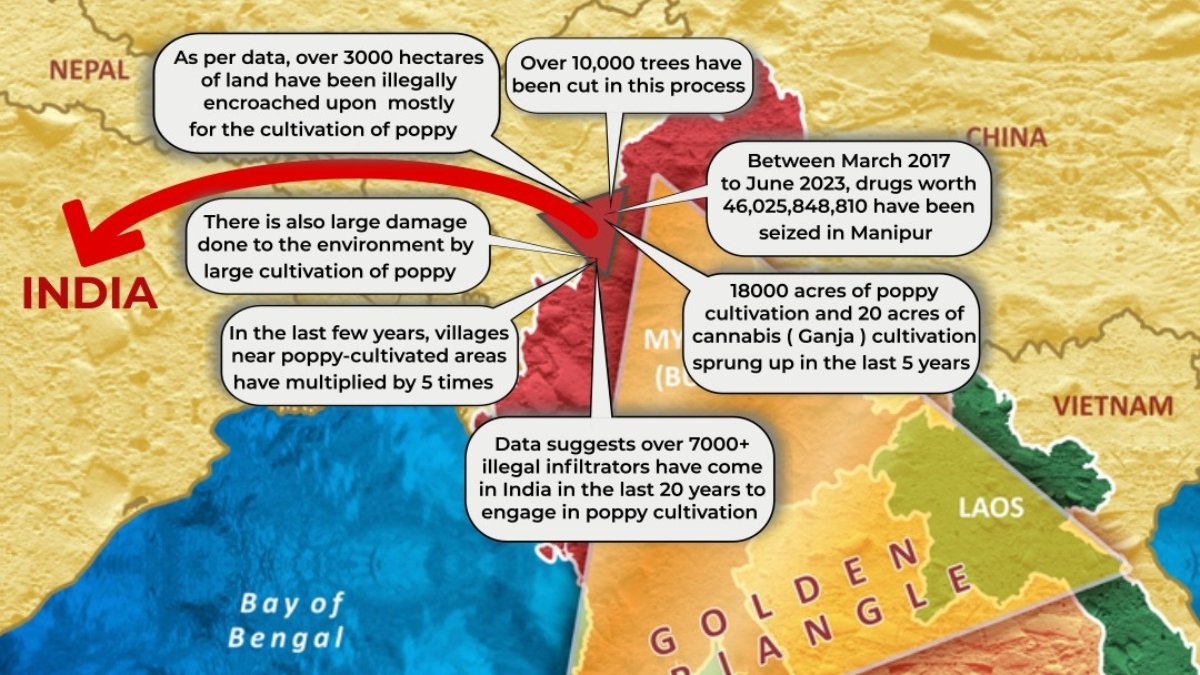
Image Source: digpu
Drug trafficking has long been a menace, not only in India but globally. In recent times, there has been a notable shift in the routes chosen by drug traffickers to evade confrontation and conflicts. A significant development has been observed in Mizoram, where traffickers seem to be strategically pivoting to avoid conflicts that have historically been prevalent in Manipur.
The Manipur Conundrum
Manipur, nestled in the northeastern part of India, has been a hotspot for drug-related conflicts. The state shares its borders with Myanmar, making it a vulnerable transit route for drug cartels. The historical prevalence of conflicts between law enforcement agencies and drug traffickers in Manipur has led to an increased focus on counter-narcotic operations.
The constant vigilance and crackdown by security forces have made drug trafficking a risky endeavor in Manipur. The state has witnessed a series of confrontations between the authorities and traffickers, leading to casualties on both sides. This scenario has prompted traffickers to explore alternative routes to ensure a smoother operation of their illicit trade.
The Mizoram Alternative
Mizoram, another northeastern state, has emerged as an alternative route for drug traffickers looking to avoid direct confrontations. The strategic shift is not only geographical but also stems from Mizoram's relatively peaceful environment compared to its neighboring states.
The state's proximity to the infamous 'Golden Triangle,' which comprises Myanmar, Laos, and Thailand, makes it an attractive option for traffickers seeking to import drugs into India. The hilly terrain and porous borders provide traffickers with ample opportunities to operate discreetly, avoiding the intense scrutiny faced in Manipur.
Challenges for Law Enforcement
The shift in drug trafficking routes poses new challenges for law enforcement agencies, particularly in Mizoram. The state, which has not been a traditional focal point for such activities, may find itself grappling with an uptick in drug-related crimes. This necessitates a proactive approach from both state and central agencies to curb the emerging threat.
UPSC Implications
From the UPSC perspective, understanding the evolving dynamics of drug trafficking is crucial for aspirants preparing for civil services examinations. Questions related to the socio-economic impact of drug trade, security challenges in the northeastern region, and the role of law enforcement agencies can be expected in the examination.
Aspirants should focus on analyzing the geopolitical factors influencing drug trafficking patterns and the implications for national security. Additionally, staying updated on the measures taken by the government to counter such challenges in states like Mizoram is essential for a comprehensive understanding of the issue.
Conclusion
The strategic shift of drug traffickers to Mizoram reflects the dynamic nature of illicit activities and the constant cat-and-mouse game with law enforcement. As the focus on Mizoram intensifies, it becomes imperative for authorities to adapt their strategies to effectively combat the evolving challenges. For UPSC aspirants, staying informed about such developments is integral to addressing questions that gauge their awareness of current affairs and their analytical abilities.